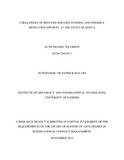| dc.description.abstract | Refugee funding problem today is founded on the dual nature of the international system, made
up of complex interplay of interstate and international bonds. Currently the solidarity of the
refugee regime is backed by close links among civil society, Non-Governmental Organizations,
the media and UNHCR itself. The study revealed that there is less humanitarian funding
globally, this was attributed to the ever growing humanitarian need and protection issues and the
presence of fewer (traditional) donors funding the refugee program leading to un-proportionate
ratio of funding vis-à-vis the refugee population. The study also revealed that, willingness of
hosting states to accept refugee inflows in this age and day, is clearly fading and moreover
because of national security concerns. Unfavorable exchange rate has also contributed to the
decreased funding thus affecting the refugee regime
The trend of reduced refugee funding has greatly impacted host countries and especially
refugees. Majority (80.6) of the beneficiary/refugee respondents indicated that reduction of
refugee funding has resulted to: Deaths from treatable diseases, trauma and psychiatric
conditions, ration cuts and malnutrition amongst children and old, some refugees even return to
uncertain conditions at home rather than stay in the camps, exploitation and abuse of women
refugees who venture out of camps in search of work, early marriage of young girls, increased
stress and domestic violence within families and increasing theft. There is also poor education
due to inadequate numbers of teachers and education facilities, deaths from treatable diseases,
trauma and psychiatric conditions. Majority (99%) of the key informants reported withdrawal of
some programs, dismissal of staff hence affecting the quality of the program.
In order to mitigate this challenge, a three phase formula (pre-crisis, during crisis and post-crisis)
that revolves around short term and longer term measures of efficiency in utilization of funds
emerged. This can be achieved by, strengthening the national frameworks available, other
frameworks incorporating Africa countries (AU) should be created to participate and have an
oversight role in prioritization of both the refugees/host countries needs/concerns. These
frameworks should devotedly work together with UNHCR to ensure that their different
frameworks address refugee needs while promoting preventive measures through encouraging good governance, resources mobilization, reconstruction and re-integration of refugees. | en_US |

